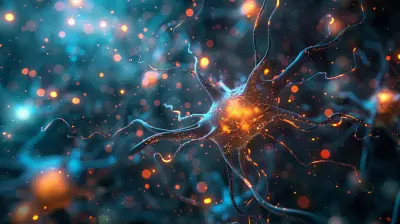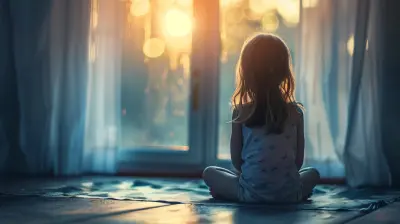The Role of Family Dynamics in Shaping Body Image Perception
21 August 2025
Let’s be real for a second—how we see our bodies? It didn’t just magically appear overnight. Nope, it’s something that started forming way back in our childhood, possibly even before we knew what “body image” meant. And believe it or not, one of the strongest influences in that shaping process is our own family.
In this article, we’re diving deep (but casually!) into how family dynamics—those daily interactions, unspoken rules, and age-old comments—can shape the way we see ourselves in the mirror. Whether it’s the way your parents approached weight, the jokes your siblings made, or even how dinner time looked in your household, it all plays a massive part.
It’s not about blaming—let’s get that clear. It’s about understanding. And the more we understand, the better we can support ourselves and future generations in creating a healthy, realistic body image.

What Exactly Is Body Image?
Before we get into the family stuff, let’s quickly define body image. In simple terms, body image is how you see yourself when you look in the mirror and how you feel about your body—your shape, size, and even the way it moves. It’s a mix of thoughts, perceptions, and emotions.And here's the kicker: your body image isn’t always about facts. It's more about feelings. Someone can be objectively healthy and fit, but still feel deeply insecure because of what they’ve been told or shown growing up.

The Family Mirror: Reflecting More Than Genes
Families are our first social environment. They’re our very first teachers. We subconsciously absorb so much from them—the way they speak about food, how they talk about bodies (theirs and others), and how they treat appearance. You could say we're like emotional sponges in those early years.So, what's being absorbed?
1. Parental Attitudes Toward Body and Weight
Ever hear your mom complain about "feeling fat" or your dad poking at his own belly? Kids pick that stuff up fast. Parents who are constantly dieting or critiquing their own appearance can unintentionally teach their kids that body dissatisfaction is normal—even expected.And when a parent comments on their child’s body? That sticks. A casual “You’re getting a little chubby” might seem harmless in the moment, but it can echo in the child’s head for years.
2. The Role of Gender Expectations
Let’s not ignore how society treats boys and girls differently when it comes to body image—and families often mirror this.Girls might get praised for being “petite” or “pretty,” while boys are expected to be “strong” or “tough.” These expectations shape how kids perceive their bodies and what they think their bodies should be.
In many households, boys are encouraged to eat more (“You’re growing—you need it!”), while girls might be told to watch their portions. Double standard? You bet. And it's one that can really mess with a kid’s relationship with food and body.
3. Siblings and Body Comparison
Ah, siblings—the built-in best friends and rivals. If you had a sibling who was naturally slimmer, more athletic, or often praised for their looks, it could have affected how you viewed yourself.Even off-handed comments like “Why can’t you be more like your sister?” can create a toxic internal comparison game.
And sibling teasing? It might be all in good fun, but if it's body-related, those “jokes” can leave deeper scars than anyone realizes.
4. Food Culture and Mealtime Dynamics
Let’s talk food. Is your family the “clean your plate” type? Or maybe you grew up in a home where dieting was a constant conversation at the dinner table?Family mealtime is more than just about eating—it’s where many of our early ideas about food and body start. Being restricted or pressured can lead to unhealthy eating habits later on. Kids might start to associate certain foods with guilt or shame, and that’s a fast track to a warped body image.
5. Emotional Environment and Support
Every family has its emotional vibe. Some are warm and open; others are more closed off or critical.If you grew up in a family where emotions weren’t really talked about, or where perfection was expected, you might’ve internalized the idea that your worth is tied to how you look. That’s heavy, right?
A supportive, loving family doesn’t guarantee perfect body image, but it gives a safe space to question harmful ideals and build resilience against outside pressures.

The Hidden Influence: Modeling Behavior
Here’s something wild—what parents and siblings DO often has a stronger impact than what they say. That’s called modeling behavior.You might not remember specific comments, but you probably remember how your mom reacted to putting on a swimsuit or how your dad talked about food. That stuff creates a blueprint in your brain.
It’s not just limited to negative influences either. Families that model body acceptance, balance, and kindness toward themselves set a powerful example.

The Pressure Cooker: Cultural and Generational Influences
Family dynamics don’t exist in a vacuum. They’re shaped by the culture and era our parents grew up in. For example, a parent raised during the low-fat craze of the ‘80s might still carry those food fears, even if science has since moved on.In some cultures, being curvy is celebrated, while in others, thinness is idealized. These beliefs often pass down to kids—sometimes spoken, often just understood.
And generational trauma plays a role too. If body shame or disordered eating patterns ran through your family tree, it’s worth exploring how those legacies might still linger.
Breaking the Cycle: Creating Healthier Family Narratives
Okay, so what can be done about all of this?First off, awareness is step one. When you understand how your family environment shaped your body image, you’re already ahead of the game. It gives you the power to rewrite your story.
Here’s how to start:
1. Talk About It
You’d be surprised how healing it can be to open up these conversations. Talk to your parents or siblings about how certain comments or attitudes affected you. They might not even realize the impact they had.And if you’re a parent yourself, talk openly with your kids about body diversity and self-acceptance. Let them see you being kind to yourself.
2. Watch Your Language
Even casual phrases like “I feel fat today” carry weight—pun intended. Try shifting the focus away from appearance and onto how you feel or what your body can do.Instead of “You look great—have you lost weight?” try “You seem really happy lately—what’s been going on?”
3. Promote a Balanced Relationship with Food
All foods fit. Let that sink in.Teaching kids (and ourselves) that food isn’t “good” or “bad” removes a ton of unnecessary guilt. Create a mealtime environment that’s relaxed, unpressured, and joyful.
4. Celebrate All Bodies
When watching TV or looking at magazines with your family, challenge unrealistic standards out loud. Point out how photos are edited, or talk about how beauty comes in all shapes and sizes.Normalize cellulite. Normalize stretch marks. Normalize aging. It all matters.
5. Get Help if You Need It
There’s zero shame in reaching out to a therapist—especially one who specializes in body image or family dynamics. They can help unpack years of internalized beliefs and guide you through making peace with your body.
It’s Not About Perfection—It’s About Progress
Let’s be kind to ourselves for a moment. Most parents, siblings, and caregivers are doing the best they can with the tools they have. It’s easy to pass down unhealthy ideas without even realizing it.Understanding the role of family dynamics isn’t about pointing fingers—it’s about taking charge. It’s about recognizing the scripts we've been handed and deciding whether or not we want to keep them.
And here's the beautiful part: change starts with awareness. The fact that you're even reading this means you're making moves toward a healthier relationship with your body—and possibly changing the legacy for your own kids, siblings, or circle.
Final Thoughts
Our families shape us in more ways than we know—including how we see our bodies. From subtle messages to loud statements, from dinner table rules to compliments and criticisms—every little thing adds up. But once we see those patterns, we have the power to challenge, reframe, and rebuild.Body image is deeply personal, but it’s also deeply communal. By understanding where our ideas came from, especially within our families, we open the door to radical self-acceptance and compassion.
And honestly? That ripple effect can change lives.
all images in this post were generated using AI tools
Category:
Body ImageAuthor:

Eliana Burton
Discussion
rate this article
1 comments
Audra McPherson
Family shapes our views, but remember—your worth shines brighter than any mirror reflection!
September 11, 2025 at 3:06 AM

Eliana Burton
Thank you for your insightful comment! Indeed, while family influences our perceptions, self-worth transcends external reflections. Embracing our unique qualities is key to a healthy body image.


